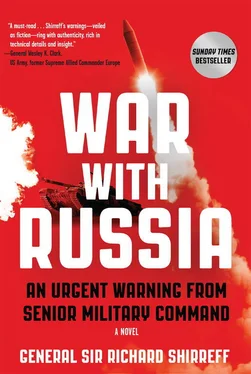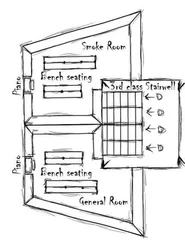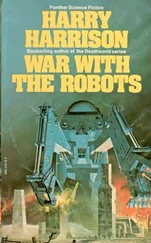Walker had no time for the British defense establishment at the best of times. In fact, he enjoyed treating them with undisguised contempt and reveled in the knowledge that his suits and unpolished shoes drove some of them into a fury, before he even started to talk down to them. But even he had to admit that the government’s approach to defense was too much smoke and mirrors and that Dillon’s criticisms had been exactly on the mark.
Walker knew full well that there was precious little proper strategic thinking going on in 10 Downing Street. He knew also from this morning’s telephone call with President Dillon in Washington that she knew that, too. But he had to give her credit for the way she’d flattered the PM and asked him to stand alongside the US. But again, it was all about creating the right perception for the focus groups on which so many government decisions were based. For the PM to be seen as new best friends with the charismatic new US female president would be good for his image with women voters and with the media. Tough and statesmanlike, it was just what the PM needed with all his ongoing EU issues.
Walker felt a tap on his shoulder and turned to see one of the PM’s close protection team. “You’re wanted outside, Trev,” he said, signaling Walker to follow him out.
Outside the pub, even Walker had to admit that the warm, spring sun shining on the translucent green of the surrounding trees was uplifting. But that was only a momentary thought as the officer pointed out a silver Mercedes E-Class, beside which Kate Bowler, the PM’s Private Secretary, was standing. Tall and slim, with brown hair tied back, she was usually enigmatically relaxed. But today Walker could see that she was grim faced and looking positively shocked, despite making an effort to compose herself.
She strode toward him as soon as she spotted him. “I need to see the PM, Trev. He’s got to get back to Downing Street. Now.”
Normally, he would have demanded to know what was going on, but not today. He had never seen Bowler like this before and now was not the moment to aggravate her. Walker turned and went back into the pub. He sidled up behind the PM’s chair.
“Sorry to interrupt, boss,” he muttered, “Kate’s outside. She says you’ve got to get straight back to Number Ten. Something important has come up.”
“Can’t it wait, Trev?” the PM said irritably. “Our food hasn’t arrived yet.”
“No, boss. You need to speak to her now.” Walker was not putting up with any argument.
The PM apologized to his wife, kissed her goodbye and ruffled his children’s hair, then reluctantly followed Walker into the Russell Arms car park.
“Couldn’t it wait, Kate? I was enjoying a brief down moment with my family,” the PM said sulkily.
Bowler was firm. “You need to get in, Prime Minister. I’ll brief you on the way to Downing Street.”
A personal protection officer opened the rear left door for the PM, who got in obediently and sat next to Bowler. Walker quickly got into the front, before any of Bowler’s team tried to take the seat. The PM’s two chase cars pulled out in front and behind, switched on their sirens and headed south for the M40 and London.
“It’s bad news, Prime Minister. Brace yourself for a shock.” Bowler faced the PM, who nodded for her to speak, all attention now.
“It’s HMS Padstow , the minehunter with the NATO mine countermeasures group. She’s been sunk with all hands in Riga. She was bombed early this morning by the Russians. They also sank a German ship. They’re invading Latvia. It’s war.”
The white-faced Prime Minister crumpled in deep shock on the seat behind him. Walker knew it was best to say nothing and leave him to feel sorry for himself. Better to spend the time thinking through the ramifications of this news and how best to spin it. But try as he might on the journey back, he could not see one good thing about what Bowler had told them. It was an unmitigated disaster and the press were going to eat them alive.
Tomorrow’s headlines didn’t bear thinking about—and as soon as he could, he’d get onto the editors to do as much damage control as possible. What that ship was even doing there, in the middle of a war zone, he could not imagine, but he would find out. He suspected that the admirals and generals had allowed this to happen. But there was no point tearing into them as they so richly deserved. At least not yet.
An hour and a quarter later, the Prime Minister was still looking pale with the shock of realizing that his career and reputation were on the line as a result of the sinking of HMS Padstow , when Walker led him from the front door of Number 10, down the long corridor to the Cabinet Room, through the double doors and into the cramped office known as the “Den.”
“CDS will be here shortly. He’s the one who set you up for this,” said Walker. “You need to show him who’s boss.”
Shortly afterward there was a knock on the door. Walker opened it and there stood General Sir Jim Mainwaring, Chief of the Defense Staff, gray-haired, short and inclined to stoutness. A man whom Walker had initially thought of as a down-to-earth West Countryman—“a soldier’s soldier” as the press had reported his appointment with evident delight—but whom he had quickly come to respect as a canny Whitehall insider, in his own way as Machiavellian as himself.
Walker had made it his business to seek out Mainwaring’s vulnerable points, so knew that he had only made his way up the greasy pole as a staff officer and had never commanded in combat. And much to Mainwaring’s chagrin, despite his chest full of medals, he had never heard a shot fired in anger. Nevertheless, Walker rather approved of the way Mainwaring had got to the top by telling politicians what they wanted to hear. That was very much the Walker way, only with a difference. He prided himself on ensuring that what politicians, especially the PM, thought they wanted, was what Walker wanted and believed was right.
Which meant that when things went wrong, he was prepared to stand behind those decisions; more than could be said for the queasy-looking general now standing outside the door, waiting to be invited to enter. Normally he just blustered straight in, as if by right. But not today. Walker had long suspected that Mainwaring could not possibly believe even half the things he had been telling the PM for the past two years. His almost sheepish demeanor now told him that he had called Mainwaring right.
Nevertheless, he puffed out his chest before he spoke. “I’ve come to brief you before you attend COBRA, Prime Minister,” he announced portentously in a strong Bristol accent.
It was enough for the Prime Minister to recover his composure. Walker had told the PM it was time to put him in his place and he did not disappoint. He spoke with withering sarcasm. “So… CDS. Sending a bunch of NATO minesweepers was going to deter the Russians, was it? Wasn’t that what you told me?”
Mainwaring knew better than to reply. Instead, he stood silent.
“Thanks to your military advice, we’re in a hell of a mess. Trev tells me this is the worst British naval disaster since the Falklands War. ‘Sunk with all hands’ will be the headlines tomorrow… How the hell do you propose getting us out of it?”
As the Prime Minister spoke he lost his control for a moment. However, instead of exploding in rage, as many a prime minister before him had done in similar circumstances, he choked. Tears welled up in his eyes and his cheeks reddened with anger. With an effort he controlled himself.
“CDS, let’s be clear. I accepted your professional military advice that the presence of the NATO group, with Padstow as part of it, would send a strong signal to the Russians. And now… and now the ship is sunk and most of the crew are dead or missing.” The Prime Minister’s voice then went ominously quiet. “Kindly explain.”
Читать дальше












